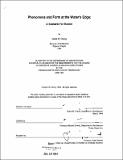Phenomena and form at the water's edge : a scenario for Boston
Author(s)
Cheng, Grace W. (Grace Wai-Mun)
DownloadFull printable version (41.54Mb)
Advisor
Michael Dennis.
Terms of use
Metadata
Show full item recordAbstract
Hypothesis. Phenomenology of Water and Design Water is an important element in our environment and thus is important in urban, architectural, and landscape design. It also has an inseparable relationship with human beings in our visual, acoustic, olfactory, and tactile environments. This thesis explores the potential for using the qualities of water as an expressive element in design to create poetic spaces. These explorations include a derivation of a language of form from the phenomenology of water: -- The physical nature of water. -- The metaphysical nature of water. -- Experiencing water with the five senses. The Water's Edge: The In-Between Zone. The waterfront is the edge that separates land and water. Historically, cities around the world have increased their footprints by infilling the water for more land. In some cases, the water has disappeared at the end of the process. This one-sided expansion at the edge has caused cities to overlook the value of waterfront. This thesis proposes that we should look at the edge from the other side-the water. The study of the edge conditions between land and water includes the following areas: -- Duality of the edge. -- Types of edge conditions. -- Threshold at the edge. Reclaiming The Water's Edge For People. In America, the water's edge is often used for industrial development. When the wharf era had passed away, the edge is often left with warehouses and factories. Both harbors and river-fronts have often suffered from the same problem of neglect and lack of development. Cities need to reclaim their water's edge as a great asset. Waterfront development should address the question of people's access to the water. Well-developed open spaces should become places where people can experience the power of water. Design Concept: A Contemporary Museum of Arts and a Water Garden. In the design explorations, set out in this thesis, a new scenario for Boston is created- an urban courtyard that stages the drama of water- a place for people to experience the water's edge and to touch water. The site that has been selected is special because it is between the Charles River and the Boston Harbor, acting like a threshold between the two zones. Nevertheless, many attributes of the site apply to other waterfronts since the site is an infilled industrial leftover area with traces of history and thus public memory offering references and meaning for design. Conclusions. The design tested the hypothesis and demonstrated how one can derive form from the phenomenology of water through an integrated design of architecture and the urban landscape. A variation of treatment of the water's edge where it meets the city, buildings, program, and the people is shown. Through the design of thresholds and the movement pattern in penetrating different spatial zones, visitors of the project can percieve the impact of the drama of water.
Description
Thesis (M.S.)--Massachusetts Institute of Technology, Dept. of Architecture, 1994. Includes bibliographical references (p. 106-108).
Date issued
1994Department
Massachusetts Institute of Technology. Department of ArchitecturePublisher
Massachusetts Institute of Technology
Keywords
Architecture